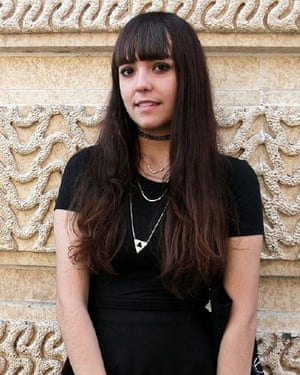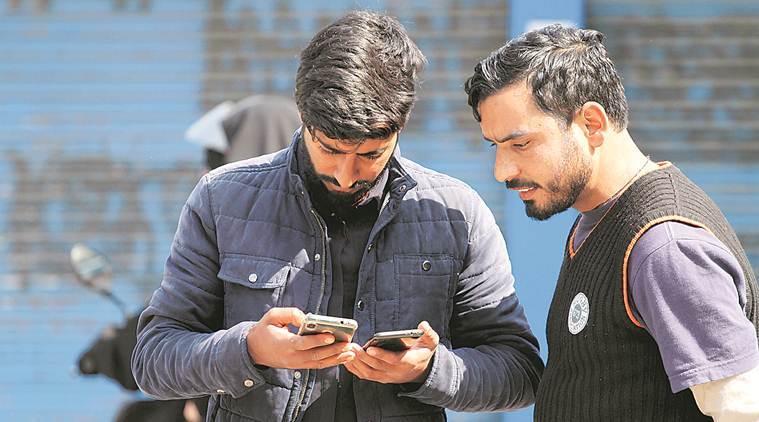Towards the end of the last decade, a distinctive minimalist style emerged among the users of the micro-blogging site Tumblr. Capital letters were largely dispensed with, save for EMPHASIS; punctuation became notable by its absence; hashtags were used mostly for irony (#wild). It didn’t take long for the site’s users – who skewed young, female and literate compared with the rest of the internet – to provide their own meta-commentary on what was happening. One post, from 2012, gained more than half a million likes:
when did tumblr collectively decide not to use punctuation like when did this happen why is this a thing
it just looks so smooth I mean look at this sentence flow like a jungle river
It has always seemed to me that any concerns about what the internet is doing to our collective mental health must be set against the poetry that it has simultaneously unleashed – the sheer range of textual innovation and expression that you can find on Tumblr or Twitter or even TikTok, the way three dots, or a question without a question mark, or “idk lol” can become loaded with meaning. It’s a point that the sociolinguist Gretchen McCulloch argues eloquently in her new book Because Internet: Understanding How Language Is Changing (Harvill Secker), which features, among other delights, a fascinating analysis of Tumblr punctuation. Far from being a crude mishmash of emojis and acronyms, she writes, “internet writing is a distinct genre with its own goals, and to accomplish those goals successfully requires subtly tuned awareness of the full spectrum of the language”.
In the past, McCulloch notes, it was only novelists, playwrights and screenwriters who had to worry about how to elicit emotional responses with their writing. For the generation who have come of age on the internet – the “full internet people” in her terminology – this is a fundamental skill. It’s something you have to learn if you want to have any kind of social life. Does it follow, then, that the internet is producing an entire generation of would-be novelists, playwrights and screenwriters? Or are novels, plays and screenplays the wrong places to be looking anyway?
Here is a typical tweet from @333333333433333, an account run by the American writer Darcie Wilder: “i thought i wanted a community of like-minded artists. then i found media twitter. and now i only wish for death”.

If you’ve spent much time on Twitter you’ll be familiar with the sentiment. You’ll probably be familiar with the way she expressed it too, that cutely depressed, archly overwhelmed, kill-me-now mode that Wilder and her contemporaries have made something of a genre. The LA-based poet Mira Gonzalez (@miragonz) is a particular master of the form. She co-authored the book Selected Tweets with the “alt-lit” writer Tao Lin (@tao_lin) and has transported its dead-eyed style into her poetry: “I wonder how it is possible that there are / billions of people in the world / yet I am the only person on the planet,” concludes the signature lyric from her collection i will never be beautiful enough to make us beautiful together (2013). Melissa Broder is another LA-based writer and tweeter. Her account @sosadtoday reaches 900,000 Twitter followers with such negative affirmations as “my shame is always looking for new ways to express itself” and “my persistent sense of impending doom says hey”.
In Wilder’s case, the username composed of numbers makes her appear to be a random bot in the void. The use of all lower case gives the impression that this stuff comes unbidden from the id. But the emphatic full stops and hyphens suggest someone who takes great care over the way she expresses herself. This was confirmed by Wilder’s debut novel, Literally Show Me a Healthy Person (2017). One reviewer compared its fragmentary self-portrait to the Portuguese avant gardist Fernando Pessoa. Zadie Smith once described it as a “perfect expression of the disease” – the disease being that distracted, defensive, eternally archived personhood that the internet seems to be creating. It’s a disease from which writers of Smith’s generation are often at pains to inoculate themselves – blocking all social media, jamming up their internet ports with glue. In Smith’s new collection, Grand Union, there is a story with a subsection called “Moods on Tumblr” that parodies Tumblr speak. “DONT ADD YOUR WEIRDO COMMENTS ON PEOPLES ART. christ.” But if it is a “disease”, it’s one that writers of Wilder’s generation (she’s 29) tend to contract young and can only learn to live with.
Literally Show Me a Healthy Person begins with a long punctuation-free sentence, all lower-case, in which the narrator describes how she once pretended not to be able to see colours to trick her mother into buying her glasses as a child: “… and now I have astigmatism and my mom is dead”. It ends with a keyboard splurge: “khdjysbfshfsjtstjsjts”.
In between, there are sardonic sales pitches: “condoms but for eye contact”. There are meta-commentaries on language: “when i use emoticons like <3 and 🙁 instead of emojis it means i mean it more”. And there is even a little Schopenhauer: “whenever i think of those non-linear theories of time where everythings always happening at the same time i feel like fucking killing myself”.
It’s a bit like scrolling through a Tumblr feed, only the broken pieces do eventually form a whole. We learn about the narrator’s mother’s death from cancer, her parents’ divorce, her father’s obliviousness, her own spiral into despair. And it is written with intent. Wilder explains that the sentences without end are an attempt to express “a brain that hadn’t healed yet”. The gaps between all the entries have a similar purpose: “Traumatised children often completely freeze. They can lose speech for a few seconds. That’s what I wanted to convey, that feeling of shock. I don’t think it would be so possible with regular punctuation.”
She recalls “corny” attempts to use txt spk and emoticons in the young adult books she read as a child. In her work, these aren’t cheap markers of youth but ways to express a distinctly internet mindset. “It’s the feeling I had when I was 23, when I was always online – the first thing I would see would be my phone, whatever job I had it was always in front of a computer, and then I would fall asleep with my phone in my hand. It’s a fragmented way to exist. It’s a bit like communicating with the world through a mirror.”
Crispin Best, a poet who often makes use of internet speak in his poetry and on Twitter (@crispinbest), welcomes this infusion of the language of the “low internet” into literary language: “there is something exciting about the new capacity,” he tells me over email, “and it feels more natural; better to be performatively unstarchy than strait-jacketed im sure.” He feels there’s not a strict age divide, but that typing in this way does come more naturally to his generation. “idk – just look at [Kristen Roupenian’s short story] cat person; people were genuinely shocked that you could have texts in a short story. I do almost feel like there was a time before you were able to have real overt ‘text speak’ in a poem, and then sort of a time after you were … which is the same as anything vogue. i guess.”
And it shouldn’t be so surprising that young women are among the most adept users of internet English. It’s a truism in sociolinguistics that young women are usually on the bleeding edge of changes to language – native speakers of the avant garde. McCulloch cites one study of letters written between 1417 and 1681 that shows it was female correspondents who were the first to adopt new words such as “does”, “has” and “makes” and phase out “doth” “hath” and “maketh”. Likewise, uptalking – where every sentence sounds like a question – originated in suburban California in the 1970s, and can now be heard among middle-aged English males. Still, fears that formal language is about to undergo some radical shift are misplaced. As McCulloch demonstrates, most of the innovations in internet English mimic features that come naturally in informal speech – emoji represent gestures; upper and lower cases represent tones; punctuation represents emphasis. Full internet people are perfectly capable of writing in full sentences when the situation demands. Though Wilder does concede that she spent so long on instant messenger at 12 and 13, she needed to relearn how to speak in real life afterwards. The appeal of typing, she says, was the ability tolook things up before you said them.
For the most part, writers have tended to incorporate the linguistic innovations of the internet in subtler ways. The appearance of an iPhone or a sext in a novel now is no more remarkable than the appearance of a horse in Jane Austen. In Elif Batuman’s The Idiot, email is crucial to the development of the central romance, as well as the medium through which her narrator Selin finds her voice. The novel opens with Selin arriving at Harvard in 1997 and receiving her first email account:
a glowing list of messages from all the people you knew, and from people you didn’t know, all in the same letters, like the universal handwriting of thought or of the world. Some messages were formally epistolary, with “Dear” and “Sincerely”; others telegraphic, all in lowercase with missing punctuation, like they were being beamed straight from people’s brains. And each message contained the one that had come before, so your own words came back to you – all the words you threw out, they came back. It was like the story of your relations with others, the story of the intersection of your life with other lives, was constantly being recorded and updated, and you could check it at any time.
Batuman has written spikily about the deleterious effects of creative writing classes on creating an “artisanal” literary style. Her own prose has a meticulousness that comes from easy access to delete, backspace, ctrl+x and ctrl+v, but also an informality and intimacy that come from email.
Sally Rooney also attributes her own literary “voice” to long email exchanges with friends. “I mean, that is my voice, isn’t it?” she has explained. “I can tamper with it and I can change it, but the idea of switching register into some lyrical form of prose writing that bears no resemblance to how I communicate on a day-to-day basis, for me, didn’t work.” In her debut novel, Conversations With Friends, the existence of multiple registers of speech brings about misunderstanding. Instant messenger – which combines the spontaneity of speech with the scrutiny of email – facilitates the breakdown of communication between Frances and her older lover Nick. Frances, a native instant messenger, is alert to tone – Nick is oblivious. Frances can then review his lack of understanding at leisure.

The discrepancy between online and offline communication is also a central theme of Richard Yates (2010) by Tao Lin. It’s about a doomed romance between a 22-year-old male writer named Haley Joel Osment and an overweight 16-year-old schoolgirl from New Jersey named Dakota Fanning, the names borrowed from real-life former child actors, much as chatroom users hide behind avatars. The lovers find blissful, bodiless connection when they communicate on Gmail chat, but the relationship descends to misery and abuse when they meet in real life. The mid-century American author Richard Yates has very little to do with it, aside from the fact that one of the characters is reading his work at one point. Lin says he chose the title in the same way you might take a random word from the body of an email and use it in the subject line. And while the prose is studiedly 21st century, it ends up mining a similar line of disconnection to that found in Yates’s Revolutionary Road or The Easter Parade.
When Melissa Broder came to write her novel, The Pisces, she wasn’t tempted to try to replicate the all lower-case style of her Twitter account. But she did “write” it on her iPhone – dictating it into the Simple Note app via Siri as she drove around LA – which gives it a similar stream-of-consciousness feel. At one point her narrator watches an Insta-glam couple flirt on Abbot Kinney Boulevard, and is appalled at how at ease they appear in their own skins. “Why were they even bothering to speak? Who had time for all this?” she wonders. Broder tells me she hadn’t realised her protagonist was so misanthropic until an early reader praised her for being “brave”.
“I was like: ‘Oh! I didn’t even realise she was depressed,’” she laughs. “It was only when I read it back that the suicidal gestures seemed so obvious. I didn’t even notice it because I was like: ‘Who wouldn’t see the world this way?’” While the novel takes place off the internet – that “petri-dish for obsession” as Broder calls it – the desire to transcend the human body is a key theme. “Longing is a big part of my life,” Broder says. “You can call it a shortage of dopamine and seratonin, you can call it depression, you can call it an awareness of the void. Either way, it’s going to be all over my tweets and all over my novel.”
When I speak to Wilder, I am relieved that she sounds a little cheerier than she does online. She now has a job – she’s social media editor for the Vice astrology app – and is writing her next novel. In proper sentences. The person who composed that wounded digital scream now feels like another self, she says. “I wrote that and then I stopped drinking. It’s like a portrait of a very messy time so that’s also an aspect of it. I don’t know. I turned 28 and I made a decision to turn auto-capitalisation on. I feel like I need to grow out of it now.”






